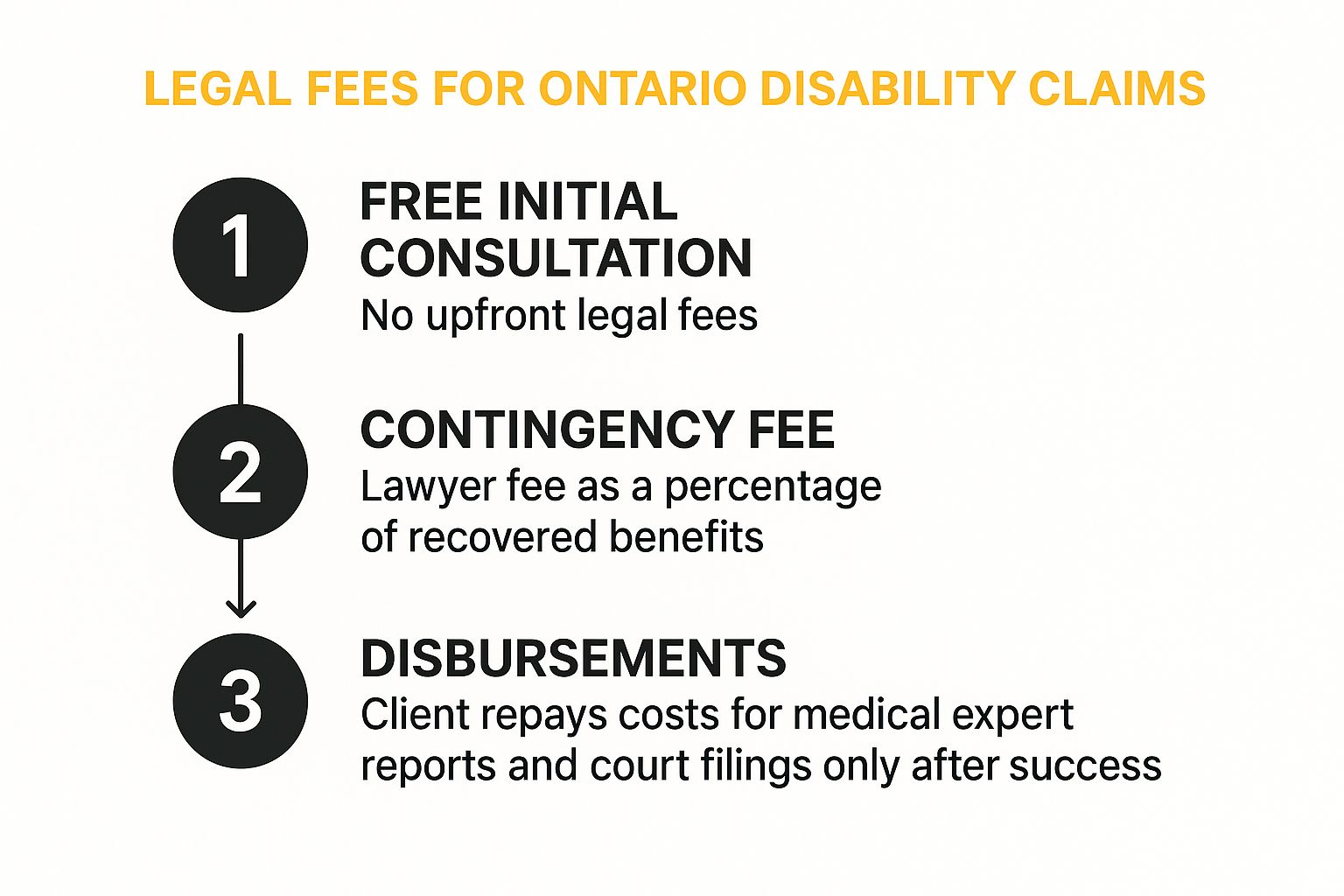Expert Short Term Disability Lawyer Burlington | Get Your Benefits
It’s a gut punch. You’ve been paying your premiums, your doctor says you can’t work, and yet, a denial letter for your Short Term Disability (STD) claim arrives. It’s incredibly frustrating, and the last thing you need when you should be focusing on your recovery.
Hiring a short term disability lawyer in Burlington is a powerful next step, but the first thing we need to do is figure out why the insurance company said no.
Unpacking Common Reasons for STD Claim Denials

Let’s be frank: insurance companies are for-profit businesses. Denying claims, or at least making the process difficult, is part of their playbook. Their reasons can seem complicated and unfair, but after years of handling these cases, you start to see the same patterns emerge.
Knowing these common tactics is the key to building a strong appeal and fighting back effectively.
Why Your Claim Might Have Been Rejected
One of the most common things I see is a denial based on a supposed lack of “objective” medical evidence. This is a classic move. The insurer will claim that while your family doctor supports you, your file doesn’t have the specific MRI, blood test, or specialist report they deem necessary to prove your disability.
Essentially, they’re ignoring your treating doctor’s opinion—the one who actually sees you—in favour of their own in-house reviewer who has never laid eyes on you.
Other common hurdles include:
- Insufficient Medical Information: Your doctor’s notes might confirm your diagnosis but fail to describe your functional limitations in the precise language the policy demands. It’s a subtle but critical distinction.
- “We Disagree with Your Doctor”: The insurer’s medical consultant, after a brief paper review, simply concludes that you are not “totally disabled” as defined by the policy, directly contradicting your own physician.
- Missed Deadlines: When you’re sick and overwhelmed, it’s easy to miss a strict deadline for submitting a form or an appeal. Insurers are quick to use this against you.
- Pre-existing Condition Clauses: They might dig into your past medical history and argue your condition existed before your coverage started, even if you had no symptoms and it was completely undiagnosed.
These denial letters can be intimidating, but they often rely on technicalities and internal policies rather than the reality of your health situation.
Decoding Common STD Claim Denials in Ontario
Understanding the insurance company’s jargon is the first step in dismantling their argument. Here’s a quick breakdown of what their reasons really mean and how a lawyer can push back.
| Reason for Denial | What It Really Means | How a Lawyer Responds |
|---|---|---|
| Lack of Objective Evidence | ”Your doctor’s opinion isn’t enough; we want a specific test result that fits our checklist.” | Gathers expert medical opinions, arranges for further testing, and builds a comprehensive file that highlights functional limitations. |
| Failure to Meet Policy Definition of ‘Total Disability‘ | “We don’t think you’re sick enough to be off any job, not just your own.” | Argues the specific legal and medical definition of disability under Ontario law and your policy, focusing on your inability to perform your job’s key duties. |
| Information is Incomplete | ”You missed a signature or a deadline, giving us an easy technical reason to deny you.” | Reviews all communication to identify errors, challenges procedural unfairness, and ensures all future submissions are flawless. |
| Pre-existing Condition Exclusion | ”We found something in your old records that lets us avoid paying, even if it’s unrelated.” | Scrutinizes the policy’s specific wording and your medical history to prove the disabling condition is new or wasn’t treated before coverage began. |
Challenging an insurer’s decision is about translating your medical reality into a compelling legal argument they can’t ignore.
The key takeaway is this: the insurance company doesn’t get the final say. An initial denial is just their opening move. A strategic legal challenge forces them to defend their decision based on Ontario law, not just their own internal playbook.
To get a better handle on the basics, you can find more details in our guide explaining short term disability in Ontario. Remember, their “no” is not the end of the road.
How a Lawyer Can Overturn a Denial

After a denial letter arrives, it’s easy to feel defeated and wonder if hiring a lawyer is really worth the effort. But a short term disability lawyer in Burlington does so much more than just fill out forms. They become your advocate, fundamentally shifting the balance of power between you and a massive insurance company. Their entire focus is to build a case so compelling that the insurer has no choice but to reconsider its denial.
One of the first things that happens is your lawyer takes over all communication. Once you have representation, the insurance company has to go through them, not you. This simple step provides immediate relief, stopping the stressful calls and preventing you from accidentally saying something that could be twisted to hurt your claim.
Building a Stronger Medical and Legal Case
A huge part of your lawyer’s job is to work with your medical team, whether they’re in Burlington, Hamilton, or elsewhere in the GTA. They know exactly what kind of language and detail insurance policies hinge on. They can guide your doctors to write reports that go beyond a simple diagnosis, clearly explaining your functional limitations and exactly how those limitations stop you from doing your job.
This takes a standard doctor’s note and turns it into a powerful piece of evidence, specifically crafted to counter the insurer’s reasons for denial. It’s all about making sure your medical file directly speaks to the definition of “disability” in your unique policy.
An experienced disability lawyer doesn’t just forward your existing medical file—they actively build upon it, gathering supplementary reports from specialists and vocational experts to create a comprehensive picture of your inability to work.
Beyond the medical evidence, your lawyer will manage all the crucial deadlines tied to your appeal under Ontario law. Missing one of these can mean losing your right to challenge the denial forever. They’ll put together a formal legal argument, submit everything on your behalf, and begin negotiating with the insurer from a position of strength. While every case is different, understanding what happens when a long term disability claim is denied can give you a good idea of the process, as many of the legal strategies are the same.
Your legal team handles it all—from digging for evidence to negotiating a settlement. This frees you up to focus on what’s truly important: your health and recovery. Simply having a lawyer on your side signals to the insurance company that you’re serious, often making them more reasonable and willing to resolve your claim fairly.
Finding the Right Disability Lawyer in the GTA

When an insurance company denies your claim, the last thing you need is more stress. The search for the right legal help can feel overwhelming, but it doesn’t have to be. Finding a top-notch short term disability lawyer in Burlington or anywhere in the GTA is about knowing where to look and what questions to ask.
Your first stop should be the Law Society of Ontario’s official directory. It’s a reliable way to confirm a lawyer is licensed and in good standing. This simple check weeds out any non-credible options right from the start.
From there, it’s smart to look for genuine client reviews and testimonials. While a firm’s own website is a good starting point, independent legal review sites often provide a more balanced picture of what it’s truly like to work with a lawyer, from their communication style to the outcomes they achieve.
Look for a True Specialist
You’ll find that many personal injury firms dabble in disability claims, but there’s a world of difference between them and a firm that specialises in this area. A true disability law specialist has spent years, sometimes decades, going head-to-head with Canada’s major insurance companies. They know their tactics, their arguments, and how to counter them effectively.
Here are a few practical ways to identify a specialist:
- Ask for Referrals: Your family doctor or other healthcare providers in the GTA often have experience with disability lawyers and might be able to recommend someone they trust.
- Scrutinise Their Website: Is their website filled with content specifically about STD and LTD claims? A deep focus on disability law, rather than a long list of other practice areas, is a very good sign.
- Ask Directly About Their Caseload: During a consultation, don’t be shy. Ask them what percentage of their practice is dedicated solely to disability insurance cases.
The single most important thing is finding a lawyer who knows the insurer’s playbook. A specialist understands the fine print in your policy and has a proven track record of successfully negotiating with or taking these massive corporations to court.
This kind of focused expertise is your best advantage. For a deeper dive, our article on finding a disability lawyer near you has even more practical advice.
What to Ask in Your Free Consultation
Think of your first meeting with a short-term disability lawyer less like a simple chat and more like an interview. You’re sizing them up just as much as they’re evaluating the merits of your case. To find the right fit, you need to ask smart questions that dig deeper than just their fees or a quick summary of their experience.
This initial consultation is your best opportunity to get a feel for their expertise, how they communicate, and their overall approach. A little preparation goes a long way.
Questions That Reveal Real Expertise
Don’t be shy about moving past the basic, “Have you handled cases like mine before?” An expert who truly specialises in this area will appreciate detailed questions and give you straight answers.
Here are a few essential questions to have ready for any lawyer you meet with:
-
What percentage of your practice is focused on short and long-term disability claims? You’re looking for a high number here. This tells you that disability law is their main game, not just something they do on the side. That specialisation is critical because they’ll be intimately familiar with the tactics insurance companies in Canada use.
-
Can you walk me through your contingency fee agreement? The lawyer should be able to clearly break down their percentage, what it applies to (like back pay or future benefits), and explain how “disbursements” work. These are the out-of-pocket costs for things like getting medical reports, and you need to know who pays for them and when. There should be zero ambiguity.
-
Who will be my main point of contact? It’s good to know upfront if you’ll be dealing directly with the senior lawyer you hired or mostly with a paralegal or junior associate. A well-run firm will have a clear system and introduce you to the team you’ll be working with.
A confident, experienced lawyer won’t just answer your questions; they’ll explain the why behind their strategy. You should leave the meeting feeling more informed and in control, not rushed or confused.
Finally, probe them for their initial take on your situation. Asking something like, “Based on what I’ve told you, what’s your initial strategic thinking on my case?” can tell you a lot.
Of course, they can’t promise a specific outcome. But they should be able to outline the likely first steps, whether that’s gathering more specific medical evidence or pointing out the weak spots in the insurer’s denial letter. Getting a clear sense of what to expect from an employment attorney free consultation is the key to making a decision you can feel good about.
Understanding Legal Fees for Ontario Disability Claims
Worrying about how to pay a lawyer is a huge source of stress, especially when you’re not getting a paycheque. The good news is that the system for disability law in Ontario is actually set up to help you get legal help without paying anything upfront.
Most lawyers who focus on disability cases work on what’s called a contingency fee basis.
This means you don’t pay any legal fees unless your lawyer wins your case and gets you money. No retainers, no hourly bills—nothing. If the claim isn’t successful, you owe them nothing for their time. It’s as simple as that.
How Contingency Fees Actually Work
When you win, the lawyer’s fee is a set percentage of the benefits they recover for you. This percentage is agreed upon right at the start, so there are no surprises.
Let’s say your lawyer secures a lump-sum settlement that covers both past and future benefits. Their fee would be a percentage of that total amount. This setup gives your lawyer a direct stake in getting you the best possible result. Their success is tied to your success.
Don’t Forget About Disbursements
Beyond the lawyer’s fee, every case has out-of-pocket expenses. We call these disbursements. These are costs your legal team pays to other people and services to build a strong case for you. They are completely separate from the contingency fee.
Some of the most common disbursements include:
- Medical Records & Reports: Your doctors will charge a fee to prepare the detailed medical evidence needed to prove your disability.
- Expert Opinions: Sometimes, we need an independent vocational or medical expert to provide an assessment that proves you can’t work.
- Court Filing Fees: These are the standard administrative costs for starting a lawsuit against an insurance company in Ontario.
With most contingency fee agreements, the law firm pays for these disbursements as they come up. You only have to pay them back out of the money you receive when your case is won.
This approach lets a short term disability lawyer in Burlington build the strongest case they can without you having to dip into your own pocket while you’re off work.
What to Expect After You’ve Hired Your Lawyer
Bringing a short-term disability lawyer on board is a huge step. For many of my clients in Burlington, it’s the moment they can finally take a real breath. The constant, stressful calls from the insurance company stop. The endless demands for more information cease. Your legal team becomes a shield, taking over all communication so you can finally put your energy where it belongs: on your health and recovery.
Your role in the process actually becomes much simpler. Your primary job is to focus on your treatment plan and keep your lawyer in the loop about your medical progress. That’s it. Behind the scenes, we’re busy building the strongest possible case for your appeal. This means methodically gathering every relevant medical file, speaking with your doctors, and identifying the precise evidence needed to dismantle the insurer’s reasons for denial.
The Road to a Resolution
Don’t expect an overnight fix—the legal system has its own pace. But it is a deliberate and structured process. Your lawyer will kick things off by filing a formal legal action against the insurance company. This isn’t just paperwork; it’s a powerful signal that you are not backing down and are fully prepared to fight for the benefits you’re entitled to.
It’s a common misconception that every claim ends up in a dramatic courtroom battle. The reality is quite different. In Ontario, well over 90% of disability claims are resolved through skilled negotiation and settlement. Our objective is to build a case so thorough and compelling that the insurance company sees it’s in their best interest to offer a fair settlement rather than face the uncertainty and expense of a trial.
The legal journey is more of a marathon than a sprint. Having an expert guide manage the deadlines, paperwork, and intense negotiations is absolutely vital. It ensures your rights are protected every step of the way while you concentrate on getting better.
Worried about the cost? Most people are. That’s why the fee structure is designed to remove financial barriers. This visual breaks down how it typically works.

This contingency model means you don’t pay any fees upfront, making expert legal help accessible when you need it most. If you’re just starting out and want to understand the initial stages, our guide on how to apply for disability benefits is a great resource.
Your Top Questions About Short-Term Disability Claims
When you’re dealing with a short-term disability claim, it’s natural to have a lot of pressing questions. It’s a confusing process, and the answers aren’t always easy to find. Here are some of the most common concerns we hear from people in Burlington and across the GTA, along with clear, practical answers.
My Claim Was Denied. How Fast Do I Need to Call a Lawyer?
The short answer is: right away. Don’t delay.
Insurance policies in Ontario have incredibly strict deadlines for appealing a denied claim. Some give you as little as 30 days from the date printed on your denial letter. If you miss that window, you could lose your right to fight the insurance company’s decision for good. Getting a lawyer involved immediately is the single best thing you can do to protect your options.
Can a Burlington-Based Lawyer Help with a Claim Elsewhere in the GTA?
Absolutely. In today’s world, your physical location doesn’t limit your access to excellent legal help. A skilled disability law firm in Burlington can easily manage cases for clients all over the Greater Toronto Area and throughout Ontario.
Most of our work—from the first chat to sharing documents and keeping you updated—happens over the phone, through video calls, and by email. It’s an efficient process designed to work for you, wherever you are.
Don’t let the thought of a courtroom battle intimidate you. It’s extremely rare for these cases to go to trial. The vast majority of disability insurance disputes in Canada are settled through skilled negotiation well before a judge ever gets involved.
A good short-term disability lawyer’s goal is to build such a rock-solid case that the insurance company sees it’s in their best interest to offer a fair settlement, avoiding the cost and time of a formal court proceeding.
If your STD claim has been denied, the clock is ticking. The experienced team at UL Lawyers is here to give you the expert guidance you need. Contact us for a free consultation to understand your rights and get your claim moving forward again.
Related Resources
A Guide to the CPP Disability Calculator in Ontario
Continue reading A Guide to the CPP Disability Calculator in OntarioHow to Apply for Disability in Canada: A Practical Guide
Continue reading How to Apply for Disability in Canada: A Practical GuideNEED A LAWYER?
We are here 24/7 to address your case. You can speak with a lawyer to request a consultation.
905-744-8888GET STARTED WITH A FREE CONSULTATION
Why Choose UL Lawyers
- Decades of combined experience
- Millions recovered for our clients
- No fee unless we win your case
- 24/7 client support
- Personalized legal strategies